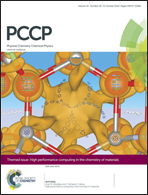On the mechanism of cold denaturation
Abstract
A theoretical rationalization of the occurrence of cold denaturation for globular proteins was devised, assuming that the effective size of water molecules depends upon temperature [G. Graziano, Phys. Chem. Chem. Phys., 2010, 12, 14245–14252]. In the present work, it is shown that the latter assumption is not necessary. By performing the same type of calculations in water, 40% (by weight) methanol, methanol, and carbon tetrachloride, it emerges that cold denaturation occurs only in water due to the special temperature dependence of its density and the small size of its molecules. These two coupled factors determine the magnitude and the temperature dependence of the stabilizing term that measures the gain in configurational/translational entropy of water molecules upon folding of the protein. This term has to be contrasted with the destabilizing contribution measuring the loss in conformational entropy of the polypeptide chain upon folding.


 Please wait while we load your content...
Please wait while we load your content...